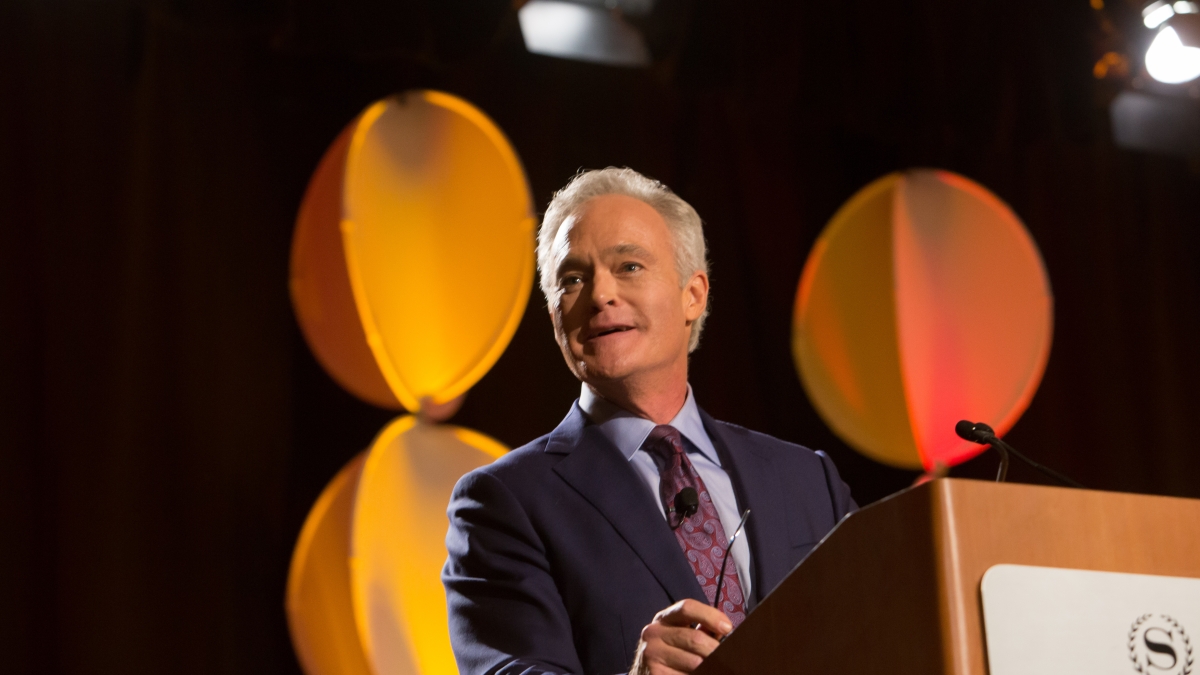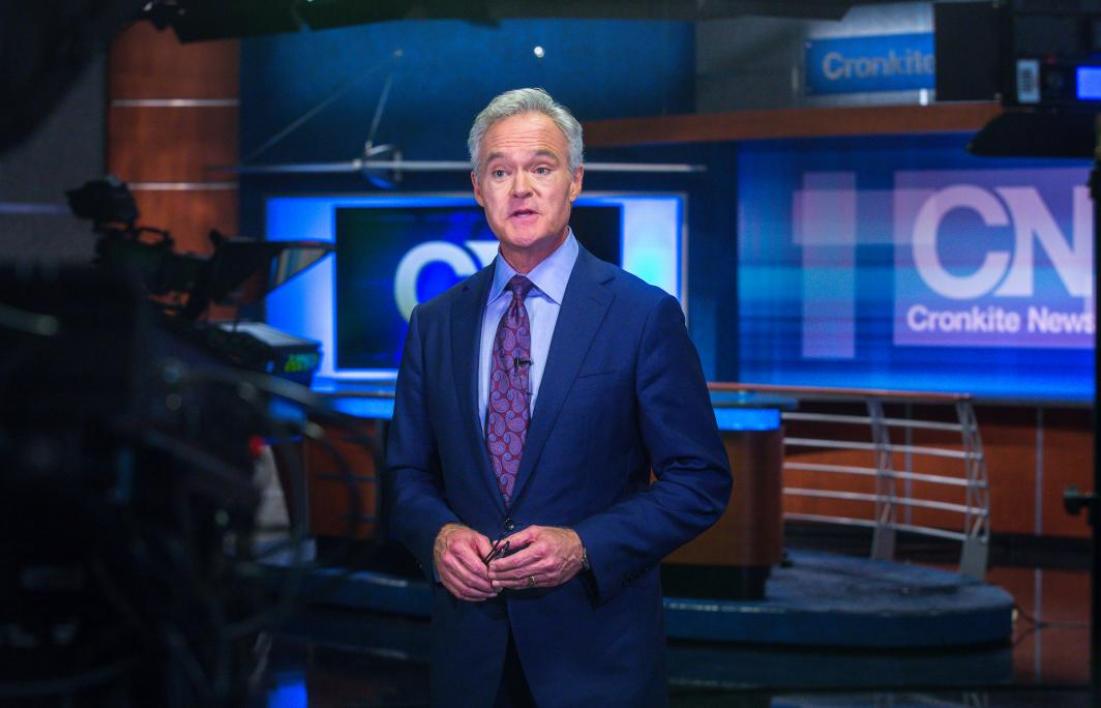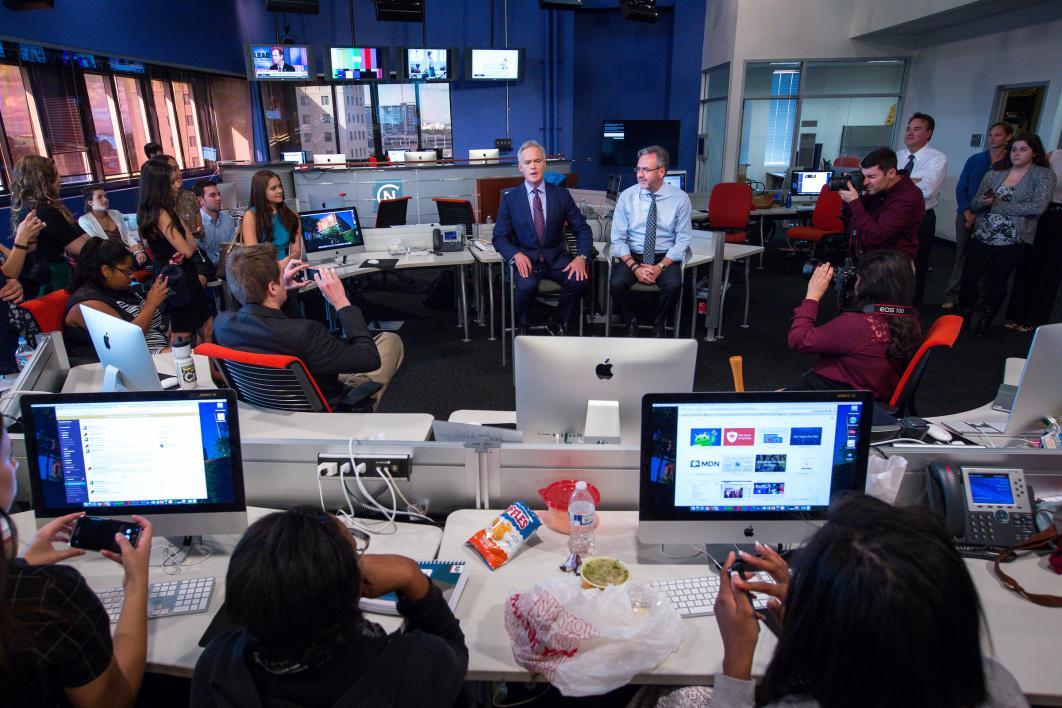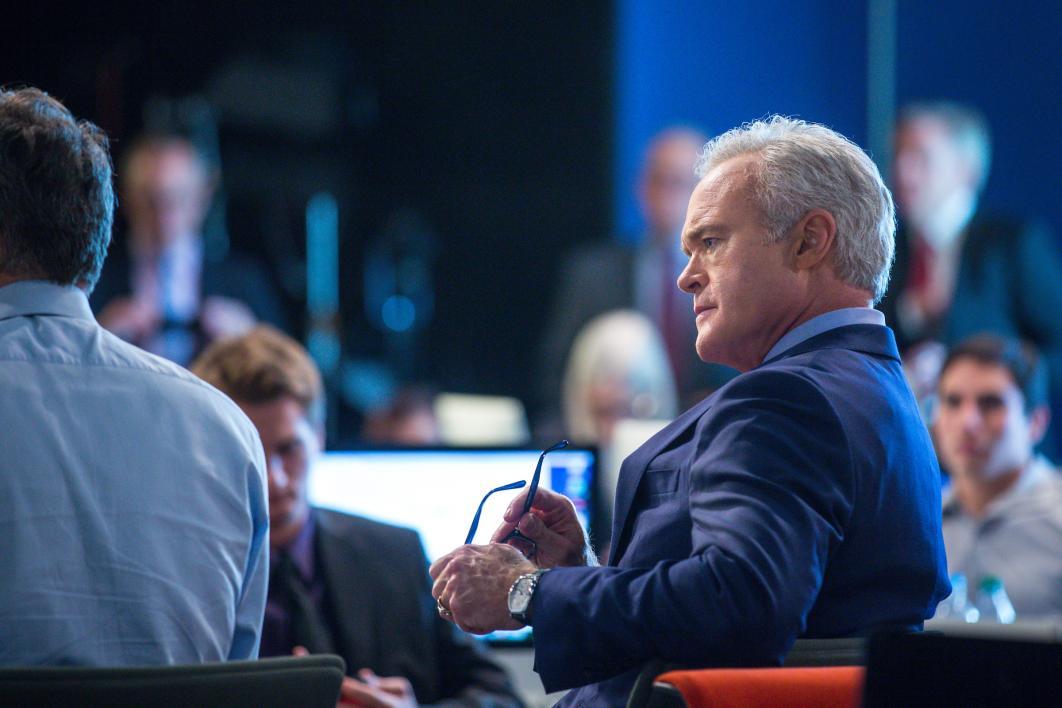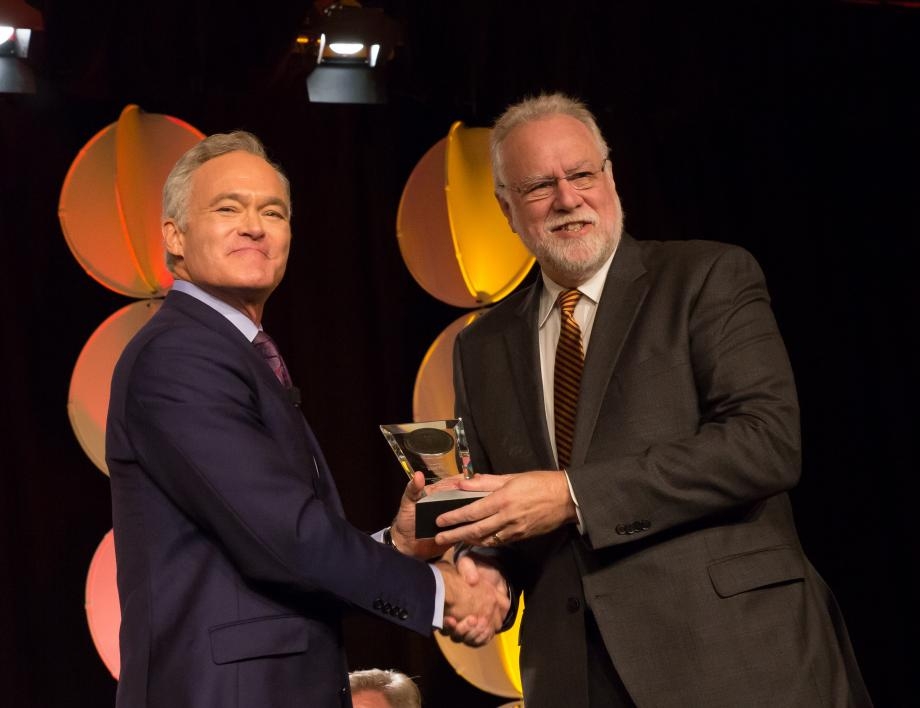Fake news stories are more than a simple annoyance — they are a genuine danger to our nation, according to Scott Pelley, award-winning managing editor and anchor of the “CBS Evening News” and correspondent of “60 Minutes.”
“Is terrorism the greatest threat to our country, or a recession?” Pelley asked. “I suggest to you today that the quickest, most direct way to ruin a democracy is to poison the information. Those are the stakes that we have to address.”
He spoke of journalism’s vital role amid changing times as he accepted the 2016 Walter Cronkite Award for Excellence in Journalism from Arizona State University on Monday.
It's no longer legacy media vs. new media; now, he said, the “dividing line in the media is the difference between journalism and junk.”
ASU Provost Mark Searle presented Pelley with the 33rd award, given by the Walter Cronkite School of Journalism and Mass Communication to recognize a distinguished journalist who embodies the values of the school’s namesake. Pelley received the award at a luncheon attended by approximately 1,000 media leaders, business executives, civic leaders, Cronkite School supporters and students at the Sheraton Grand Phoenix hotel.
Pelley discussed the groundswell of false information masquerading as journalism on social media and news-aggregator sites. He pointed to the recent presidential election, highlighting false reporting on each of the candidates.
“The bigger question is, for all of us going into the future — what is the responsibility of a Facebook or a Google?” he said. “Are they utilities? Are they unconscious conduits that pass along any and all information without any responsibility to use human intelligence and the standards of journalism to stop false reporting?
“What is the responsibility of the audience? Is it completely up to us to see these stories and make the decision on whether we want to give them credibility or not?”
He cited what he called a disturbing trend toward biased reporting, on both the left and the right — outfits that traffic in confirming information, telling people that what they already believe is correct — and algorithms that redistribute reports among like-minded people.
“We’re becoming a nation of information tribes,” Pelley said. “We’re in our digital citadels, unchallenged by ideas. Biased reporting closes minds. Journalism is meant to open them.”
The CBS News anchor also discussed what it takes to be a great journalist today. He told the story of Syrian citizen journalist Hadi Al Abdullah, who continued with his reporting even after being seriously injured in a bombing in Aleppo. Pelley touched on the news values embodied by Walter Cronkite, noting that Cronkite’s drive to get things right made him the best in the world.
Pelley also discussed the work being done at the Cronkite School to educate the next generation of journalists.
“The stakes are high,” Pelley said. “We need great journalists in this country, and I am so encouraged by the work that I have seen being done here (at the Cronkite School). I am enormously humbled by this honor, and I thank you, one and all from the bottom of my heart.”
As part of his two-day visit to ASU, Pelley broadcast the “CBS Evening News” from ASU’s Downtown Phoenix Campus on Monday.
On Sunday, he toured the Cronkite School and participated in a moderated discussion with students. The talk, moderated by Karla Liriano, a Cronkite senior, touched on a variety of topics, including the recent election, Walter Cronkite and journalism’s impact on America.
“People take it for granted that we have the best journalism in the world,” Pelley told students. “People come from around the world to study journalism at Arizona State University and other great j-schools because this is one of America’s great ideas and one of America’s great products.”
Pelley took questions from students and offered them career advice, stressing the importance of strong writing and encouraging them to be relentless in the pursuit of their dreams.
“Don’t take ‘no’ for an answer,” he said. “We need you.”
Cronkite presented the first award bearing his name in 1984 to CBS executives William Paley and Frank Stanton. He was a fixture at the luncheons until his death in 2009.
Pelley joins previous Cronkite Award recipients that include television journalists Tom Brokaw, Diane Sawyer and Bob Schieffer; newspaper journalists Ben Bradlee and Bob Woodward; and newspaper publishers Katharine Graham and Otis Chandler. Last year’s winner was Charlie Rose, “CBS This Morning” anchor and host of the respected late-night talk show on PBS.
“We’re becoming a nation of information tribes. We’re in our digital citadels, unchallenged by ideas. Biased reporting closes minds. Journalism is meant to open them.”
— journalist Scott Pelley
This year’s Cronkite Award Luncheon was one of several initiatives that celebrated the life and legacy of the late “CBS Evening News” anchor, who would have been 100 this month.
In September, the Cronkite School, CBS News and the Newseum hosted a special event in Washington D.C., featuring Cronkite faculty and alumni as well as leading journalists that included Pelley, PBS NewsHour anchor Gwen Ifill, CBS News contributor Bob Schieffer and 60 Minutes correspondent Lesley Stahl.
Cronkite students also organized a gathering on Cronkite’s birthday — Nov. 4 — which featured more than 150 students and a video greeting from Cronkite’s grandson Walter L. Cronkite IV, who works as a Capitol Hill producer at CBS News.
“We believe there is no more appropriate and deserving recipient of the 2016 Cronkite Award than Scott Pelley of CBS News,” said Cronkite Dean Christopher Callahan during Monday’s luncheon. “Scott is, in many ways, the standard-bearer of the kind of journalism that Walter Cronkite defined for so many of us — deep, fact-based, objective, accurate, honest journalism.”
Pelley encouraged his fellow journalists during his acceptance speech Monday to “examine our own flaws, our own hubris” and emphasized the importance of fair, objective media.
“We often hear the rallying cry, ‘United we stand!’ That’s not the strength of America,” Pelley said. “The miracle of America is, ‘Divided we stand.’ We are the most diverse nation on Earth, and yet we can see past those things that divide us, and all to bring on this bigger idea of a democratic republic, the bigger idea that we are all Americans and we all belong here.
“Journalism is the medium through which we have that conversation; it’s how we understand one another, it’s how we respect one another; it is how we have empathy for one another’s ideas. The alternative is a new cold war, this time a civil war.”
Top photo: Scott Pelley speaks to about 1,000 media leaders, business executives, civic leaders, Cronkite School supporters and students at the Sheraton Grand Phoenix hotel on Monday as he accepts the 2016 Walter Cronkite Award for Excellence in Journalism from ASU. Photo by Ashley Lowery/ASU
More Law, journalism and politics

How to watch an election
Every election night, adrenaline pumps through newsrooms across the country as journalists take the pulse of democracy. We gathered three veteran reporters — each of them faculty at the Walter…
Law experts, students gather to celebrate ASU Indian Legal Program
Although she's achieved much in Washington, D.C., Mikaela Bledsoe Downes’ education is bringing her closer to her intended destination — returning home to the Winnebago tribe in Nebraska with her…

ASU Law to honor Africa’s first elected female head of state with 2025 O’Connor Justice Prize
Nobel Peace Prize laureate Ellen Johnson Sirleaf, the first democratically elected female head of state in Africa, has been named the 10th recipient of the O’Connor Justice Prize.The award,…
